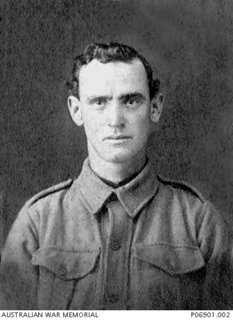Pte
Arthur Ernest Cork
Informations sur naissance
|
Année de naissance: 1891 |
|
Lieu de naissance: Surry Hills, Sydney, New South Wales, Australia |
Informations générales
|
Profession: Cordonnier |
|
Religion: Church of England |
Informations service militaire
|
Pays: Australia |
|
Force armée: Australian Imperial Force |
|
Rang: Private |
|
Numéro de service: 3730 |
|
Incorporation date: 31/08/1915 |
|
Incorporation nom de lieu: Sydney, New South Wales, Australia |
|
Unités: — Australian Infantry, 2nd Bn. (Dernière unité connue) |
Informations sur décès
|
Date de décès: 03/10/1917 |
|
Lieu de décès: Jabber Trench, Westhoek, Belgique |
|
Cause du décès: Killed in action (K.I.A.) |
|
Âge: 26 |
Mémorial
|
Ypres (Menin Gate) Memorial Panneau: Bay 7 stone H |
Distinctions et médailles 2
|
British War Medal Médaille |
|
Victory Medal Médaille |
Points d'intérêt 2
| #1 | Lieu de naissance | ||
| #2 | Lieu d'enrôlement |
Mon histoire
Private Arthur Ernest enlisted the AIF at the age of 24 on 16/08/1915 at Sydney, Australia. The former bootmaker served with the 2nd Australian Battalion, part of the 1st Australian Division, 1st Australian Brigade. For reasons unknown, he enlisted as a single man and gave his mother as next of kin, but he was actually married to Isabel Cork and had 1 daughter Brenda Nora.
According to the official papers of the CWGC Arthur Ernest was killed in action the 3rd October 1917 although many papers (Service records and Death Certificate) are talking about 4th October. In both cases, the 2nd Australian Battalion was at the front near Westhoek Ridge and participated in the Battle of Polygon Wood (26/9/17) as in the Battle of Broodseinde (4/10/17) both part of the Battle of Passchendaele in 1917. The 2nd Bn. A.I.F. were put in the frontline near Molenaarelsthoek on the night of 30 September / 1 October. Between 1 and 4 October they suffered from several German attacks, very active shelling and artillery barrages. All of the attacks could be repulsed.
When taking their positions on the 3rd October 1917 to start the attack in the early morning the next day, the 2nd Australian Battalion was again heavily shelled by the Germans. Patrols were send out on the night of the 3rd/4th to find out the condition of No-Man’s Land and also to see what posts the Germans occupied.
Private Arthur Ernest Cork was killed in action during these operations. He was burried at Jabber Track (J.k.b.4.3.), at the same location as his brother William, but his body was never recovered. Now he is commemorated on the Menin Gate Memorial at Ypres, bay 7 stone H together with his younger brother William Cork who fell also on 4th October 1917.
Two other brothers 2705 Driver Clarence Stanley Cork (the youngest, age 20, also a shearer), and 6734 Private Sydney Thornton Cork (father of five, aged 36) both returned safely to Australia.
According to the official papers of the CWGC Arthur Ernest was killed in action the 3rd October 1917 although many papers (Service records and Death Certificate) are talking about 4th October. In both cases, the 2nd Australian Battalion was at the front near Westhoek Ridge and participated in the Battle of Polygon Wood (26/9/17) as in the Battle of Broodseinde (4/10/17) both part of the Battle of Passchendaele in 1917. The 2nd Bn. A.I.F. were put in the frontline near Molenaarelsthoek on the night of 30 September / 1 October. Between 1 and 4 October they suffered from several German attacks, very active shelling and artillery barrages. All of the attacks could be repulsed.
When taking their positions on the 3rd October 1917 to start the attack in the early morning the next day, the 2nd Australian Battalion was again heavily shelled by the Germans. Patrols were send out on the night of the 3rd/4th to find out the condition of No-Man’s Land and also to see what posts the Germans occupied.
Private Arthur Ernest Cork was killed in action during these operations. He was burried at Jabber Track (J.k.b.4.3.), at the same location as his brother William, but his body was never recovered. Now he is commemorated on the Menin Gate Memorial at Ypres, bay 7 stone H together with his younger brother William Cork who fell also on 4th October 1917.
Two other brothers 2705 Driver Clarence Stanley Cork (the youngest, age 20, also a shearer), and 6734 Private Sydney Thornton Cork (father of five, aged 36) both returned safely to Australia.
Rapports avec d'autres militaires 1
|
William Cork
Brother |
Sources 8
|
AIF Project https://www.aif.adfa.edu.au/showPerson?pid=62831 Sources utilisées |
|
CWGC https://www.cwgc.org/find-records/find-war-dead/casualty-details/1598485/arthur-ernest-cork/ Sources utilisées |
|
Image https://trove.nla.gov.au/search/category/images?keyword=Cork%203730 Sources utilisées |
|
Service Records https://recordsearch.naa.gov.au/SearchNRetrieve/Interface/ViewImage.aspx?B=3421110 Sources utilisées |
|
The Australian War Memorial https://www.awm.gov.au/advanced-search/people?people_preferred_name=cork&people_service_number=3730&people_unit= Sources utilisées |
|
The Long Long Trail http://www.longlongtrail.co.uk/army/order-of-battle-of-divisions/1st-australian-division/ Sources utilisées |
|
War Diary 1st Brigade https://www.awm.gov.au/collection/C1347439 Sources utilisées |
|
War Diary 2nd Battalion https://www.awm.gov.au/collection/C1347983 Sources utilisées |
